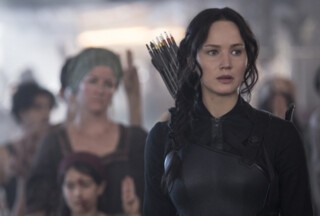On Jennifer Lawrence
Lidija Haas
Beauty, acting, stardom: we do and don't want to think it all takes work. Jennifer Lawrence is a gift to both points of view: a disciplined pro with a bow and arrow, who really did skin that squirrel for Winter's Bone, and who already at 24 has three Best Actress Oscar nominations (and a win) behind her, she's also the pointedly low-maintenance everygirl who drinks too much and throws up, trips over her dress when accepting her Academy Award, announces on the red carpet that her strapless Dior dress is giving her ‘armpit vaginas’. Stephen Colbert riffed on her reputation for earthy authenticity when he suggested that, like Katniss Everdeen, her character in the Hunger Games movies, she was plucked from obscurity to become an eventual role model, and that Kentucky, where she was born and grew up, is ‘a little District 12-y in places’.
One key to Lawrence’s success is her ability, onscreen and off, to perform ordinariness when she is anything but. There’s a joke of sorts about this in the latest Hunger Games instalment, Mockingjay: Part 1. The rebel leaders want Katniss to be their propaganda figurehead, but she isn’t actress enough for the job: she can’t say it well unless she’s feeling it for real. This couldn’t be less true of Lawrence, who can switch fast and hard between emotions: from one moment to the next she can register lust, melancholy, cunning, glee, contempt, rage, compassion, each with startling conviction. She can look like a fleshy teen, 1930s vamp or hardened warrior; in Mockingjay there are scenes where her eyes retreat into a puffy, exhausted face, and others where her cheekbones re-emerge and she’s a sculpted, gleaming Joan of Arc again. (In the X-Men franchise she plays Mystique, a woman who can turn into anyone.)
The shapeshifting adds to the air of old-school repertory that attends Lawrence’s collaborations with Bradley Cooper and David O. Russell. Silver Linings Playbook dragged (an admittedly cutesy version of) mental illness into the Hollywood mainstream even as it played on the traditional romcom’s tendency to reframe stalking as devotion, psychosis as romance; it isn’t easy to imagine Russell pulling off that bait-and-switch with a different woman in the lead.
As a movie hero for teenage girls, Lawrence as Katniss is a far less dispiriting candidate than most of the alternatives. Her charisma is not merely seductive but persuasive. When she described the theft of naked photos of her as a ‘sex crime’ in Vanity Fair, those among us who’d searched for them on the internet were given pause, even if we weren’t ready to concede that we’d been ‘perpetuating’ any such thing. She wasn’t going to be embarrassed, she said, but people who looked ought to be: ‘You should cower with shame.’ She can’t escape the treatment all Hollywood women receive, but it’s to her credit that no one expects her to smile and take it.
